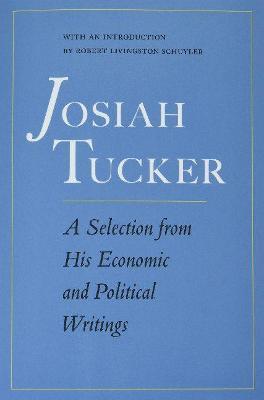Josiah Tucker: A Selection from His Economic and Political Writings

Josiah Tucker: A Selection from His Economic and Political Writings
Josiah Tucker was one of the foremost thinkers of eighteenth-century England in the fields of economics, international relations, political theory, and imperialism. In his introduction, Robert Livingston Schuyler writes: Tucker was one of the first . . . to envisage the whole range of economic life as a proper and worthy subject of scientific inquiry . . ., [which] ought to be cultivated as such, especially by statesmen and legislators. This opinion he expressed as early as 1749, before anybody had produced a systematic treatise on economics. Tucker shared the opinion, prevalent in his day, that Great Britain was underpopulated and observed with regret the immigration to America, believing that the colonies brought Britain no benefits. He thought instead that colonies were too costly to be beneficial, and, as early as 1749, he asserted that American colonies would seek independence as soon as they no longer needed Great Britain's assistance. He is one of the few men in England who consistently wrote and preached that the separation of the colonies would spell the ruin of England. Born of Welsh peasant stock in Laugharne, Carmarthenshire, in 1713, Tucker was educated at St. John's College, Oxford, and became successively a curate and rector at St. Stephen's Church in Bristol. This led him to take considerable interest in politics and trade, as Bristol was second only to London in commerce in Great Britain during Tucker's years of residence there. During the greater portion of a long life he poured out a succession of pamphlets on these matters. He was appointed dean of Gloucester in 1758. He died in 1799 and was buried in Gloucester Cathedral. This edition (originally published by Columbia University Press in 1931) contains seven of Tucker's writings, two of which are of special economic interest: "The Elements of Commerce and Theory of Taxes" and "Instructions for Travellers." In the former selection, Tucker denounces monopoly in all its forms, yet he occupies an intermediate position between the rigid exclusiveness of mercantilism and the freedom of trade of Adam Smith. While he ventures from Smith in some ways, it is often said that Tucker's work anticipates the classic doctrines of Wealth of Nations, which was written twenty years later. Other writings in the volume include a remarkable tract on war, which illustrates progressive, pacifistic thought; and a treatise on civil government, written to refute the contract theory of the state. Tucker dispo
PRP: 104.88 Lei
Acesta este Prețul Recomandat de Producător. Prețul de vânzare al produsului este afișat mai jos.
94.39Lei
94.39Lei
104.88 LeiLivrare in 2-4 saptamani
Descrierea produsului
Josiah Tucker was one of the foremost thinkers of eighteenth-century England in the fields of economics, international relations, political theory, and imperialism. In his introduction, Robert Livingston Schuyler writes: Tucker was one of the first . . . to envisage the whole range of economic life as a proper and worthy subject of scientific inquiry . . ., [which] ought to be cultivated as such, especially by statesmen and legislators. This opinion he expressed as early as 1749, before anybody had produced a systematic treatise on economics. Tucker shared the opinion, prevalent in his day, that Great Britain was underpopulated and observed with regret the immigration to America, believing that the colonies brought Britain no benefits. He thought instead that colonies were too costly to be beneficial, and, as early as 1749, he asserted that American colonies would seek independence as soon as they no longer needed Great Britain's assistance. He is one of the few men in England who consistently wrote and preached that the separation of the colonies would spell the ruin of England. Born of Welsh peasant stock in Laugharne, Carmarthenshire, in 1713, Tucker was educated at St. John's College, Oxford, and became successively a curate and rector at St. Stephen's Church in Bristol. This led him to take considerable interest in politics and trade, as Bristol was second only to London in commerce in Great Britain during Tucker's years of residence there. During the greater portion of a long life he poured out a succession of pamphlets on these matters. He was appointed dean of Gloucester in 1758. He died in 1799 and was buried in Gloucester Cathedral. This edition (originally published by Columbia University Press in 1931) contains seven of Tucker's writings, two of which are of special economic interest: "The Elements of Commerce and Theory of Taxes" and "Instructions for Travellers." In the former selection, Tucker denounces monopoly in all its forms, yet he occupies an intermediate position between the rigid exclusiveness of mercantilism and the freedom of trade of Adam Smith. While he ventures from Smith in some ways, it is often said that Tucker's work anticipates the classic doctrines of Wealth of Nations, which was written twenty years later. Other writings in the volume include a remarkable tract on war, which illustrates progressive, pacifistic thought; and a treatise on civil government, written to refute the contract theory of the state. Tucker dispo
Detaliile produsului










